高考英语反义疑问句的讲解
高考英语反义疑问句用法
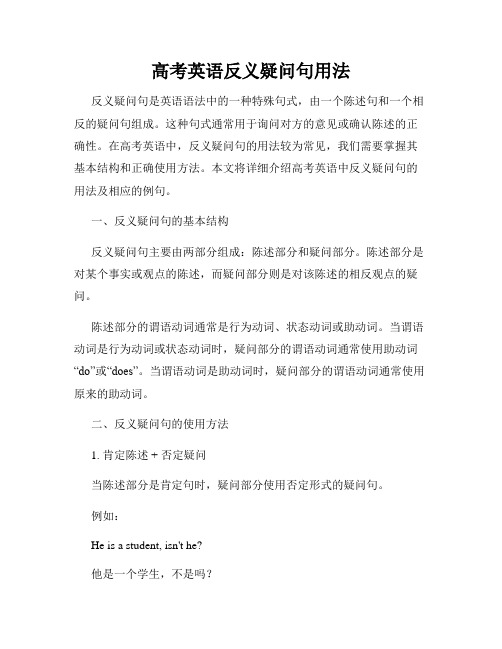
高考英语反义疑问句用法反义疑问句是英语语法中的一种特殊句式,由一个陈述句和一个相反的疑问句组成。
这种句式通常用于询问对方的意见或确认陈述的正确性。
在高考英语中,反义疑问句的用法较为常见,我们需要掌握其基本结构和正确使用方法。
本文将详细介绍高考英语中反义疑问句的用法及相应的例句。
一、反义疑问句的基本结构反义疑问句主要由两部分组成:陈述部分和疑问部分。
陈述部分是对某个事实或观点的陈述,而疑问部分则是对该陈述的相反观点的疑问。
陈述部分的谓语动词通常是行为动词、状态动词或助动词。
当谓语动词是行为动词或状态动词时,疑问部分的谓语动词通常使用助动词“do”或“does”。
当谓语动词是助动词时,疑问部分的谓语动词通常使用原来的助动词。
二、反义疑问句的使用方法1. 肯定陈述 + 否定疑问当陈述部分是肯定句时,疑问部分使用否定形式的疑问句。
例如:He is a student, isn't he?他是一个学生,不是吗?2. 否定陈述 + 肯定疑问当陈述部分是否定句时,疑问部分使用肯定形式的疑问句。
例如:She doesn't speak French, does she?她不会说法语,对吗?3. 陈述部分有实义动词如果陈述部分有实义动词(非助动词),则疑问部分使用助动词“do”或“does”。
例如:They like playing basketball, don't they?他们喜欢打篮球,对吗?4. 陈述部分有助动词如果陈述部分有助动词,则疑问部分使用原来的助动词。
例如:You can swim, can't you?你会游泳,对吗?5. 以let's开头的陈述句以let's开头的陈述句,疑问部分使用shall we。
例如:Let's go to the park, shall we?我们去公园吧,好吗?三、高考英语中的应用示例1. 完成句子The weather is nice today, ________?天气今天不错,是吗?2. 完成句子Tom isn't coming to the party, ________?汤姆不来参加聚会,是吗?3. 完成句子She will never forget this experience, ________?她永远不会忘记这个经历,对吗?4. 完成句子They have already finished their homework, ________?他们已经完成作业了,是吗?5. 完成句子Let's study harder for the exam, ________?让我们更努力地为考试学习,好吗?总结:反义疑问句是高考英语中的常见语法现象,掌握好其基本结构和正确使用方法对于理解和运用该句式非常重要。
反意疑问句讲解_修改版
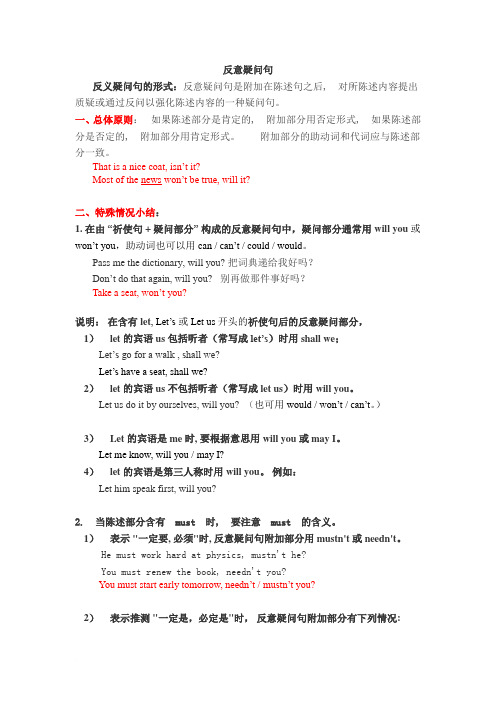
反意疑问句反义疑问句的形式:反意疑问句是附加在陈述句之后, 对所陈述内容提出质疑或通过反问以强化陈述内容的一种疑问句。
一、总体原则:如果陈述部分是肯定的, 附加部分用否定形式, 如果陈述部分是否定的, 附加部分用肯定形式。
附加部分的助动词和代词应与陈述部分一致。
That is a nice coat, isn’t it?Most of the news won’t be true, will it?二、特殊情况小结:1. 在由“祈使句 + 疑问部分”构成的反意疑问句中,疑问部分通常用will you或won’t you,助动词也可以用can / can’t / could / would。
Pass me the dictionary, will you? 把词典递给我好吗?Don’t do that again, will you?别再做那件事好吗?Take a seat, won’t you?说明:在含有let, Let’s或Let us开头的祈使句后的反意疑问部分,1)let的宾语us包括听者(常写成let’s)时用shall we;Let’s go for a walk , shall we?Let’s have a seat, shall we?2)let的宾语us不包括听者(常写成let us)时用will you。
Let us do it by ourselves, will you? (也可用would / won’t / can’t。
)3)Let的宾语是me时, 要根据意思用will you或may I。
Let me know, will you / may I?4)let的宾语是第三人称时用will you。
例如:Let him speak first, will you?2. 当陈述部分含有must 时, 要注意must 的含义。
1)表示 "一定要, 必须"时, 反意疑问句附加部分用 mustn't 或 needn't。
英语反义疑问句的问句与回答归纳

英语反义疑问句用法讲解一、基本概念及结构:反义疑问句又叫附加疑问句,是指当提问的人对前面所叙述的事实不敢肯定,而需要向对方加以证实时所提出的问句。
其结构为:前一部分是一个陈述句,后一部分是一个简短的问句。
完成后一部分简短问句时,要根据前面陈述句的动词时态和人称来选择适当的助动词进行提问,前后两部分的人称和动词时态要保持一致。
如果前一部分用肯定式,后一部分一般用否定式;反之,前一部分为否定式,后一部分要用肯定式,即“前肯定后否定,前否定后肯定”。
例如:You don’t like rock music, do you 你不喜欢摇滚乐,对吧二、反义疑问句的回答不管是前否后肯,还是前肯后否形式的反义疑问句,回答都根据事实回答,肯定的答案就用yes+肯定结构,否定的答案就用no+否定结构,答案要和实际情况相符。
也叫实事求是例如:1、--She is good at English, isn't she--Yes, she is. 是的,她擅长或者No, she isn't.不,她不擅长2、--There isn't a computer in your r oom, is there“你的房间里没有电脑,对吗?-- Yes, there is.不,有电脑或者 No,there isn't.是的,没有电脑。
三、其他规则:1、陈述部分用否定词或半否定词 no , nothing, nobody, never, few, seldom, hardly, rarely, little 等否定含义的词时,疑问部分用肯定形式。
例如:He is never late for school, is he?他上学从不迟到,是吗2、陈述部分的谓语是used to 时,疑问部分用didn’t +主语或 usedn’t +主语。
例如:He used to take pictures there, didn’t / usedn’t he 他过去常常在那儿拍照,是吗You used to sleep with the windows open, usedn’t/ didn’t you你过去常常开着窗户睡觉,是吗?3、陈述部分为祈使句时,祈使句后加附加问句,不表示反意,而表示一种语气。
英语反义疑问句的问句与回答归纳

英语反义疑问句用法讲解一、基本概念及结构:反义疑问句又叫附加疑问句,是指当提问的人对前面所叙述的事实不敢肯定,而需要向对方加以证实时所提出的问句。
其结构为:前一部分是一个陈述句,后一部分是一个简短的问句。
完成后一部分简短问句时,要根据前面陈述句的动词时态和人称来选择适当的助动词进行提问,前后两部分的人称和动词时态要保持一致。
如果前一部分用肯定式,后一部分一般用否定式;反之,前一部分为否定式,后一部分要用肯定式,即“前肯定后否定,前否定后肯定”。
例如:You don’t like rock music, do you? 你不喜欢摇滚乐,对吧?二、反义疑问句的回答不管是前否后肯,还是前肯后否形式的反义疑问句,回答都根据事实回答,肯定的答案就用yes+肯定结构,否定的答案就用no+否定结构,答案要和实际情况相符。
也叫实事求是例如:1、--She is good at English, isn't she?--Yes, she is. 是的,她擅长或者No, she isn't.不,她不擅长2、--There isn't a computer in you r room, is there?“你的房间里没有电脑,对吗? -- Yes, there is.不,有电脑或者 No,there isn't.是的,没有电脑。
三、其他规则:1、陈述部分用否定词或半否定词 no , nothing, nobody, never, few, seldom, hardly, rarely, little 等否定含义的词时,疑问部分用肯定形式。
例如:He is never late for school, is he?他上学从不迟到,是吗?2、陈述部分的谓语是used to 时,疑问部分用didn’t +主语或 usedn’t +主语。
例如:He used to take pictures there, didn’t / usedn’t he? 他过去常常在那儿拍照,是吗?You used to sleep with the windows open, usedn’t/ didn’t you?你过去常常开着窗户睡觉,是吗?3、陈述部分为祈使句时,祈使句后加附加问句,不表示反意,而表示一种语气。
高考英语反义疑问句

19)否定前缀不能视为否定词, 其反意疑问句仍用否定形式。 It is impossible, isn't it?
He is not unkind to his classmates, is he?
6. 反义疑问句的回答用yes,no 但是,当陈述部分是否定形式时, 回答要按事实。 They don’t work hard, do they? Yes, they do.
反义疑问句 (The Disjunctive Question)又 叫附加疑问句。它表示提问人的 看法,没有把握,需要对方证实。 反义疑问句由两部分组成:前一 部分是一个陈述句,后一部分是 一个简短的疑问句,两部分的人 称时态应保持一致。
1.陈述部分肯定式 + 疑问部分 否定式 They work here, don’t they? She was ill yesterday, wasn’t she?
不, 他们工作努力。 No, they don’t. 对, 他们工作不努力。
It is a fine day. Let’s go fishing, _sh_a_l_l_w_e_? Let us do this job,_w_i_ll_y_o_u_? Turn on the radio,_w_i_ll_y_o_u_?
18)陈述部分是"there be"结构 的,疑问部分用there省略主语 代词。
Everyone is in the classroom, aren’t they?
Everything begins to grow in spring, doesn’t it?
Nobody will go, will they?
16)带情态动词dare或need的反 意疑问句,疑问部分常用 need (dare ) +主语。
高考英语 高频语法串讲 反义疑问句

高考英语语法专讲:反义疑问句一.概念反意疑问句是附加在陈述句之后,对陈述句所表示的事实或观点提出疑问的句子.附加疑问实际上是一种简略的一般疑问句.二.相关知识点精讲1.反意疑问句的结构:陈述句(主语+谓语……),+助动词/情态动词/be动词+主语(代词形式)?说明:陈述句部分如果是肯定句,反意疑问句,疑问句部分的助动词/情态动词/be动词+not (否定提问);如果陈述句部分是否定句,反意疑问句,疑问句部分用肯定式提问。
例句:He is your teacher, isn’t he?People shouldn’t drop litter on the pavements, should they?You foun d the key in the bedroom, didn’t you?They have a house in town, haven’t they? /don’t they?The boy has to clean his room, doesn’t he?I am right, aren’t I?They’d rather go by bus, wouldn’t they?You’d better change your wet skirt, hadn’t you?He’d like to join our discussion, wouldn’t he?She ought to see a doctor at once, shouldn’t she? / oughtn’t she?I wish to s ay a few words, may I?That’s nice, isn’t it?This i s the place, isn’t it?Everybody knows the answer, don’t they?Nothing is serious, isn’t it?T here wasn’t enough time at that moment, was there?There used to a tower here, usedn’t there? / didn’t there?What you need is more practice, isn’t it?2.某些特殊句型的反意疑问句:1)祈使句的反意疑问句:表示肯定意义的祈使句,即表示“请求,提示”它的反意疑问句用will you 表达:有时也可以用won’t you 表示。
(完整版)英语语法:反义疑问句专项讲解.doc

(完整版)英语语法:反义疑问句专项讲解.doc反义疑问句一、反义疑问句又叫附加疑问句。
反义疑问句由两部分组成:前一部分是一个陈述句,后一部分是一个简短的疑问句,两部分的人称时态应保持一致。
1.陈述部分为肯定式 + 疑问部分为否定式(如果陈述部分的否定词带有否定前缀,那么,该陈述部分作肯定处理,附加疑问部分一般仍用否定形式)e.g. She was ill yesterday, wasn’ t she?Tom dislikes the book, doesn’ t he?2. 陈述部分为否定式+ 疑问部分为肯定式(陈述部分用no, nothing, nobody, never, few, seldom, hardly, rarely, little等否定或半否定含义的词时,疑问部分用肯定式。
)e.g. He can ’ t ride a bike, can he?Some plants never blown ( 开花 ), do they ?二、附加疑问句(一)主语的选择1.陈述部分的主语是I ,疑问部分要用aren't I.I ’ m as tall as your sister, aren't I?注:当陈述部分的主语是I,而句子又用来征询对方的意见时,附加疑问句中的主语用you。
如:I find English very interesting, don’t you?I don ’t like that film, do you?2.当陈述部分的主语是everybody, everyone, someone, nobody, no one, somebody 等合成代词时,附加疑问句中的主语通常用they,亦可用 he,如:Somebody phoned while I was out, didn’t they?Everyone enjoyed the party, didn’t they?Nobody wants to go there, does he?3.当陈述部分的主语是不定代词everything, nothing, anything, something时,附加疑问句中的主语一般用it ,如:Everything seems all right now, doesn’t it?Nothing is kept in good order, is it?Something must be done to stop pollution, isn’t it?4.当陈述部分的主语是指示代词this, that 或 these, those 时,附加疑问句中的主语分别用it 和 they,如:This is important, isn’t it?That isn ’t correct, is it?These are your friends Tom and Jack, aren’t they?5.如果陈述部分是以代词one 作主语,附加疑问句中的主语在正式场合用one,非正式场合下可以用you 或 he,如:One can’t be too careful, can one?或 can you?One should do his duty, shouldn’t he?16.当陈述句为there be 结构时,附加疑问句中的主语也用there。
(完整版)反义疑问句详细讲解及习题及答案
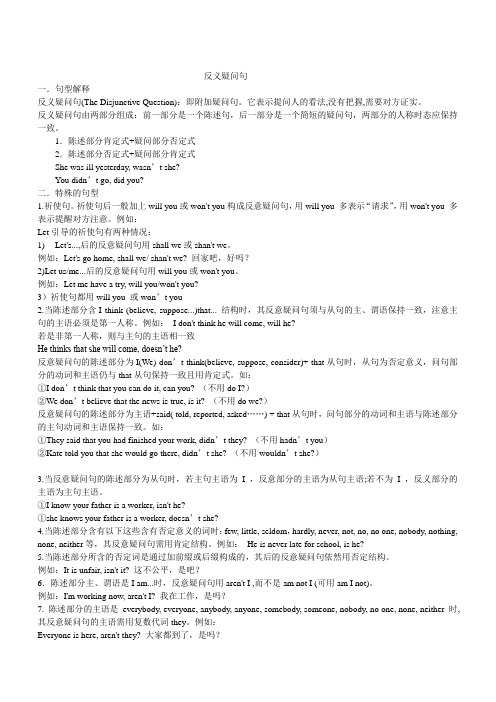
反义疑问句一.句型解释反义疑问句(The Disjunctive Question):即附加疑问句。
它表示提问人的看法,没有把握,需要对方证实。
反义疑问句由两部分组成:前一部分是一个陈述句,后一部分是一个简短的疑问句,两部分的人称时态应保持一致。
1.陈述部分肯定式+疑问部分否定式2.陈述部分否定式+疑问部分肯定式She was ill yesterday, wasn’t she?You didn’t go, did you?二.特殊的句型1.祈使句。
祈使句后一般加上will you或won't you构成反意疑问句,用will you 多表示“请求”,用won't you 多表示提醒对方注意。
例如:Let引导的祈使句有两种情况:1) Let's...,后的反意疑问句用shall we或shan't we。
例如:Let's go home, shall we/ shan't we? 回家吧,好吗?2)Let us/me...后的反意疑问句用will you或won't you。
例如:Let me have a try, will you/won't you?3)祈使句都用will you 或won’t you2.当陈述部分含I think (believe, suppose...)that... 结构时,其反意疑问句须与从句的主、谓语保持一致,注意主句的主语必须是第一人称。
例如:I don't think he will come, will he?若是非第一人称,则与主句的主语相一致He thinks that she will come, doesn’t he?反意疑问句的陈述部分为I(We) don’t think(believe, suppose, consider)+ that从句时,从句为否定意义,问句部分的动词和主语仍与that从句保持一致且用肯定式。
(完整版)高考英语反意疑问句讲解及练习
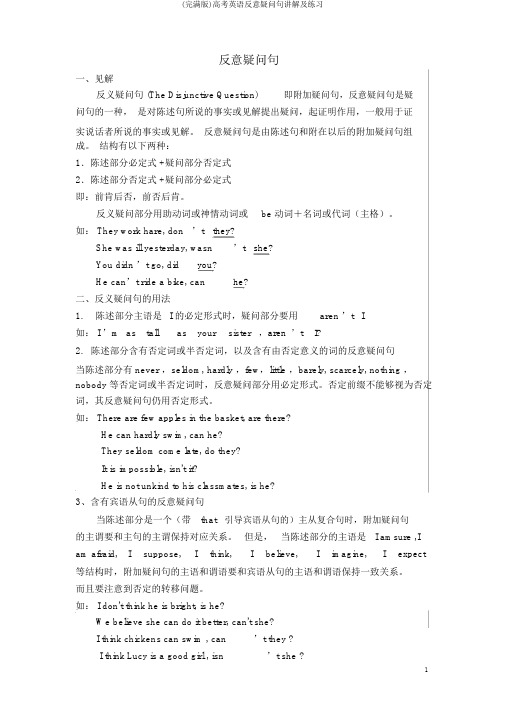
反意疑问句一、见解反义疑问句 (The Disjunctive Question)即附加疑问句,反意疑问句是疑问句的一种,是对陈述句所说的事实或见解提出疑问,起证明作用,一般用于证实说话者所说的事实或见解。
反意疑问句是由陈述句和附在以后的附加疑问句组成。
结构有以下两种:1.陈述部分必定式 +疑问部分否定式2.陈述部分否定式 +疑问部分必定式即:前肯后否,前否后肯。
反义疑问部分用助动词或神情动词或be 动词+名词或代词(主格)。
如: They work hare, don’t they?She was ill yesterday, wasn’t she?You didn ’t go, did you?He can’t ride a bike, can he?二、反义疑问句的用法1. 陈述部分主语是I 的必定形式时,疑问部分要用aren ’t I.如: I ’m as tall as your sister,aren’t I?2.陈述部分含有否定词或半否定词,以及含有由否定意义的词的反意疑问句当陈述部分有 never ,seldom, hardly ,few,little ,barely, scarcely, nothing ,nobody 等否定词或半否定词时,反意疑问部分用必定形式。
否定前缀不能够视为否定词,其反意疑问句仍用否定形式。
如: There are few apples in the basket, are there?He can hardly swim, can he?They seldom come late, do they?It is impossible, isn't it?He is not unkind to his classmates, is he?3、含有宾语从句的反意疑问句当陈述部分是一个(带that引导宾语从句的)主从复合句时,附加疑问句的主谓要和主句的主谓保持对应关系。
2022年高考英语备考之语法反义疑问句与倒装句详解

语法:反义疑问句与倒装句详解反意疑问句和倒装句一、反意疑问句(disjunctive questions/ tag questions)1.前一句是肯定句,后面要用否定问句;前面是否定句,包括句子里带有否定意义的词如never, seldom, hardly, scarcely, rarely, few, little, no, nothing, none 等,后面要用肯定问句。
eg. He has made few friends in his class, has he?You seldom meet with this kind of matter, do you?She said nothing at the meeting, did she?但是要注意,impossible, dissatisfy, uncomfortable这类词不是否定词。
eg. He is impossible to finish the work by himself, isn’t he?The result of the maths exam dissatisfied yo u, didn’t it?You failed to pass the test, didn’t you?2.前后的人称要一致,但后面的问句中只能用代词,不能用名词。
如果前面的主语是everything, anything, something,nothing那么在问句中用it作主语;如果前面是everyone, everybody, no one, nobody, someone, somebody, anyone, anybody, those, all(指人)等词作主语,那么后面问句可以用he或者they作主语,现在用they 更加普遍。
eg. Everything is ready, isn’t it?Nothing can prevent him from working, can it?Everyone in the village knew the man, didn’t they/ he?如果是there be的句型,那么后面的问句就用引导词there。
反义疑问句详细讲解及习题及答案-反意疑问句-反义疑问句题目及答案解析

反义疑问句之巴公井开创作一.句型解释反义疑问句(The Disjunctive Question):即附加疑问句.它暗示提问人的看法,没有掌控,需要对方证实.反义疑问句由两部份组成:前一部份是一个陈说句,后一部份是一个简短的疑问句,两部份的人称时态应坚持一致.1.陈说部份肯定式+疑问部份否定式2.陈说部份否定式+疑问部份肯定式She was ill yesterday, wasn’t she?You didn’t go, did y ou?二.特殊的句型1.祈使句.祈使句后一般加上will you或won't you构成反意疑问句,用will you 多暗示“请求”,用won't you 多暗示提醒对方注意.例如:Let引导的祈使句有两种情况:1) Let's...,后的反意疑问句用shall we或shan't we.例如:Let's go home, shall we/ shan't we? 回家吧,好吗?2)Let us/me...后的反意疑问句用will you或won't you.例如:Let me have a try, will you/won't you?3)祈使句都用will you 或won’t you2.当陈说部份含I think (believe, suppose...)that... 结构时,其反意疑问句须与从句的主、谓语坚持一致,注意主句的主语必需是第一人称.例如: I don't think he will come, will he? 若是非第一人称,则与主句的主语相一致He thinks that she will come, doesn’t he?反意疑问句的陈说部份为I(We) don’t think(believe, suppose, consider)+ that从句时,从句为否定意义,问句部份的动词和主语仍与that从句坚持一致且用肯定式.如:①I don’t think that you can do it, can you? (不用do I?)②We don’t believe that the news is true, is it? (不用do we?)反意疑问句的陈说部份为主语+said( told, reported, asked……) + th at从句时,问句部份的动词和主语与陈说部份的主句动词和主语坚持一致.如:①They said that you had finished your work, didn’t they? (不用hadn’t you)②Kate told you that she would go there, didn’t she? (不用wouldn’t she?)3.当反意疑问句的陈说部份为从句时,若主句主语为 I ,反意部份的主语为从句主语;若不为 I ,反义部份的主语为主句主语.①I know your fa ther is a worker, isn't he?①she knows your father is a worker, doesn’t she?4.当陈说部份含有以下这些含有否定意义的词时:few, little, seldom,hardly, never, not, no, no one, nobody, nothing, none, neither等,其反意疑问句需用肯定结构.例如: He is never late for school, is he?5.当陈说部份所含的否定词是通过加前缀或后缀构成的,其后的反意疑问句依然用否定结构.例如:It is unfair, isn't it? 这不公平,是吧?6.陈说部份主、谓语是I am...时,反意疑问句用aren't I ,而不是am not I (可用am I not).例如:I'm working now, aren't I? 我在工作,是吗?7. 陈说部份的主语是 everybody, everyone, anybody, anyone, somebody, someone, nobody, no one, none, neither 时, 其反意疑问句的主语需用复数代词they.例如:Everyone is here, aren't they? 年夜家都到了,是吗?No one knows about it, do they? 没有人知道这件事,对吗?8.陈说部份的主语是everything, nothing, anything或something 时,反意疑问句的主语应用代词it.例如:Something is wrong with my radio, isn't it?我的收音机出毛病了,是吧?9.陈说部份的主语是指示代词this或that时,反意疑问句的主语用it,当陈说部份的主语是指示代词these或those时,其反意疑问句的主语用they.例如:This is a plane, isn't it? 这是一架飞机,是吗?These are grapes,aren't they? 这些是葡萄,是吗?10.陈说部份的主语是不定代词one时,反意疑问句的主语可以用one,也可用you.例如:One should be ready to help others, shouldn't one?每个人都应该乐于助人,是吧?11. 当陈说部份谓语动词是need, dare,且这些词被用作实义动词时,其反意疑问句需用do的适当形式.例如:He needs help, doesn't he?他需要帮手,是吗?12.当陈说部份主语是从句、不定式(短语)、动词ing形式时,反意疑问句的主语应该用it.例如:What you need is more important, isn't it?你需要的工具更重要,是吧?12.have(has)不是暗示“有”的意思,并在句中做谓语时,其反意疑问句的助动词要用do, does, did.例如:They had a meeting just now,didn't they?他们刚才开了个会,是吗?15.陈说部份有have to 时,其反意疑问句要用助动词的否定形式.例如:You have to water the vegetables every day, don't you?You had to water the vegetables every day, didn't you?16.He used to stay up late, usedn’t he/ didn’t he?17.陈说部份是there be句型时,其反意疑问句中要用there. There was a hospital here, wasn't there?18.陈说部份有had better时,反意疑问句中要用hadn't.例如:We’d better go to school at once, hadn't we?He’d rather go home, wouldn’t he?19.当陈说部份含有情态动词must时,我们便要分析一下must的含义.如果must 作“一定;要;必需”讲,反意疑问句须用mustn't或needn't;而当must作推测意义“一定是;肯定”讲时,反意疑问句则需根据must后的动词原形选用相应的形式.例如: He must work hard at physics, mustn't he?他必需努力学物理,是吧?Tom must be at home,isn't he? 汤姆一定在家,是吧①He might have forgotten his pen in the classroom yesterday, didn’t he?(不用mightn’t he?/ hasn’t he?)②You must have got up late this morning, didn’t you?(不用mustn’t you?/haven’t you?)20.反意疑问句的回答用yes, no, 可是,回答意思相反,当陈说部份是否定形式时,回答要按事实.例如:They don’t work hard, do they?Yes, they do. 不,他们工作努力./No, they don’t. 对, 他们工作不努力.反意疑问句的陈说部份为I am……时,问句部份习惯上用aren’t I?暗示.如:I am a very honest man, aren’t I?反意疑问句二反意疑问句是英语四年夜问句之一,它是由一个陈说句加上一个短问句而构成的.反意疑问句的基本构成形式是:陈说句+动词(肯定或否定)+主语?如:①She often has lunch at school, doesn’t she? ②You don’t like sports, do you?一、反意疑问句中问句部份的动词与陈说部份的动词在语气上成相反的对应关系,即:肯定+否定?否定+肯定?如:①You can’t do it, can you? ②They are very late for the meeting, aren’t they?二、反意疑问句中问句部份的动词与陈说部份的动词种类要对应一致.如:①He has supper at home every day, doesn’t he? (不能用hasn’t he?)②They have known the matter, haven’t they? (不能用don’t they?)三、反意疑问句中问句部份的动词在时态上应和陈说部份的时态一致.如:①They will go to town soon, won’t they?(不能用don’t they?或aren’t they?)②He works very hard, doesn’t he?(不能用didn’t he?或won’t he?)四、反意疑问句的陈说部份带有little, few, never, hardly, seldom等否定意义的词时,问句部份用肯定式.如:①She nev er tells a lie, does she?(不用doesn’t she?)②He was seldom late, was he?(不用wasn’t he?)五、反意疑问句的陈说部份含有由un, im, in, dis, 等否定意义的前缀构成的词语时,陈说部份要视为肯定含义,问句部份用否定形式.如:①Your father is unhappy, isn’t he?(不能用is he?)②The man is dishonest, isn’t he? (不能用is he?)六、反意疑问句的陈说部份为I am……时,问句部份习惯上用aren’t I?暗示.如:I am a very honest man, aren’t I?八、反意疑问句的陈说部份为I(We) don’t think(believe, suppose, consider)+ that从句时,从句为否定意义,问句部份的动词和主语仍与that从句坚持一致且用肯定式.如:①I don’t think that you can do it, can you? (不用do I?)②We don’t believe that t he news is true, is it? (不用do we?)九、反意疑问句的陈说部份为非第一人称主语+ think(believe, suppose, consider) + that从句时,问句部份的动词和主语与陈说部份的主句动词和主语坚持一致.如:①They all think that English is very important, don’t they? (不用isn’t it?)②He didn’t think that the news was true, did he? (不用wasn’t/ was it?)十、反意疑问句的陈说部份为主语+said( told, reported, asked……) + that从句时,问句部份的动词和主语与陈说部份的主句动词和主语坚持一致.如:①They said that you had finished your work, didn’t they? (不用hadn’t you)②Kate told you that she would go there, didn’t she?(不用wouldn’t she?)十一、陈说部份的主语为不定代词something, anything, nothing, everything时,问句部份的主语用it.如:①Something is wrong with the computer, isn’tit?②Nothing has happened to them, has it?十二、陈说部份的主语为不定代词somebody(someone),anybody(anyone), nobody(no one), everybody(everyone)时,问句部份的主语用he或 they,这时问句动词的数应和he或 they一致.如:①Someone has taken the seat, hasn’t he?②Everyone has done their best in the game, haven’t they?十三、陈说部份为Let me……时,问句部份习惯上用shall I? 或will you?形式.如:Let me have a try, shall I?(will you?)十四、陈说部份为Let us……时,问句部份习惯上用will you? 陈说部份为Let’s……时,问句部份习惯上用shall we?如:Let us stop to rest, will you?Let’s go home together, shall we?十六、陈说部份用上述情况以外的祈使句时,问句部份一般用will you?形式暗示请求,用won’t you?形式暗示委婉请求或邀请.如:①Do sit down, won’t you?/ will you? ②Jim,you feed the bird today, will you?③Please open the window, will you?(won’t you?)十七、陈说部份为否定祈使句时,问句部份一般用will you?如:Don’t make any noise, will you?十八、陈说部份为There (Here) + be + 主语时,问句部份用动词+there(here)?.如:①There are two cakes on the plate, aren’t there?②Here is a story about Mark Twain, isn’t here?十九、陈说部份用had better +原形动词暗示建议时,问句部份用hadn’t +主语?.①You’d better tell him about the matter, hadn’t you?②We had better do it by ourselves, hadn’t we?二十、陈说部份用used to +主语时,问句部份用didn’t + 主语?或usedn’t①He used to live in the country, didn’t he?/usedn’t he?②They used to be good friends, didn’t they?/usedn’t they?二十一、陈说部份用must(may, might) + have + Ved暗示推测时,若句中带有明显的过去时间的状语,问句部份动词用过去时形式.如:①He might have forgotten his pen in the classroom yesterday, didn’t he?(不用mightn’t he?/ hasn’t he?)②You must have got up late this morning, didn’t you?(不用mustn’t you?/haven’t you?)二十二、陈说部份用must(may, might) + have + Ved暗示推测时,若句中没有带明显的过去时间的状语,问句部份动词用现在完成时形式.如:①Everyone must have known the death of the waitress, haven’t they? (不用mustn’t they?)②You must have worked there a year ago, didn’t you?(不用mustn’t you?/ haven’t you?)二十三、陈说部份的主语为从句时,问句部份的主语一般用it取代,如:①What he said is true, isn't it? (不用didn’t he?)②Where we will build the dam has not been decided yet, has it? (不用won’t we?)二十四、陈说部份的主语为动名词或不定式时,问句的主语用it取代.如:①To do one good deed is easy for a person, isn'tit?②Skating is your favorite sport, isn't it?反意疑问句考点反意疑问句是高考重要考点,其构成形式是"肯定 + 否定"和"否定+ 肯定",但也有一些特例.本文结合高考试题,对反意疑问句的易考点进行归纳.1. 陈说句部份的谓语是be, had better或情态动词等时,反意疑问句仍用这些动词.[原题再现]Bill's aim is to inform the viewers that cigarette advertising on TV is illegal, ________?A. isn't itB. is itC. isn't heD. is he谜底: A2. 陈说部份的谓语是have时,若have作"有"解,反意疑问部份用have (has) 或do (does)的肯定或否定式; 若have作使役动词,则只能用do (does, did)的适当形式进行反问.[原题再现]His wife had the front door painted green yesterday, ________she?A. didB. hadC. didn'tD. hadn't谜底: C3. 陈说部份含有no, never, seldom, hardly, few, little, nowhere, nothing等否定意义的词时,反意疑问部份用肯定形式;但陈说部份若使用含有否定意义的前缀或后缀的词时,反意疑问部份仍然使用否定形式.[原题再现]He seldom has lunch at school, ________?A. hasn't heB. has heC. doesn't heD. does he谜底: DThey dislike English, don't they? 他们不喜欢英语,不是吗?4、含有下列情态动词时构成的反意疑问句形式a、陈说句有had better时,问句中用had (hadn’t) .You’d better go home now, hadn’t you?b、陈说句中有 must暗示“必需”时问句用 needn't或mustn'tYou must do your homework, mustn't you?/ needn't you?We mustn’t go home, must (need) we?c、must暗示“推测”时,问句中则不能用情态动词,而需要用其它形式.如:She must be in the room, isn’t she?You must have been to Shanghai, haven’t you?[原题再现]There is no light in the dormitory. They must have gone to the lecture, ________?A. didn't theyB. don't theyC. mustn't theyD. haven't they谜底: D5. 陈说部份的主语是everyone, everybody, anyone, anybody, someone, no one等不定代词时,其疑问部份的主语可根据句子的内涵选用he或they.例如:Everyone knows his job, doesn't he?Everyone had lent you a hand when you were in trouble,6. 陈说部份的主语是something, anything, everything, nothing等不定代词,其疑问部份的主语一般用it.例如: Everything is ready, isn't it?Nothing goes well, does it?7. 陈说部份是there be句型时,反意疑问部份用"...there?". [原题再现]There's not much news in today's paper, ________?A. isn't itB. are thereC. is thereD. aren't there谜底: C8. 陈说部份谓语含有used to时,反意疑问部份可用usedn't,也可用didn't;陈说部份含有ought to时,反意疑问部份可用oughtn't或shouldn't两种形式.例如:Tom used to make fun of Peter, usedn't / didn't he?We ought to learn the law knowledge by heart, oughtn't / shouldn't we?9. 陈说部份的主语是this, that,不定式短语、动名词短语或从句时,反意疑问部份的主语用it;陈说部份的主语是these, those 时,反意疑问部份的主语用they.例如:This is a most wonderful place, isn't it?Learning a foreign language well takes a long time,That they are close friends doesn't seem true, does it? 10. 陈说部份的主语后有同位语从句或定语从句修饰时,反意疑问部份仍应对主句主语进行反问.[原题再现]The news that they failed their driving test discouraged him, ________?A. did theyB. di dn't theyC. did itD. didn't it谜底: D11. 陈说部份为含有宾语从句的主从复合句时,通常要对主句主语进行反问;但如果陈说部份是"I (don't) think / suppose / believe / imagine / expect等 + 宾语从句"时,要对宾语从句的主语进行反问,同时要注意否定转移现象.[原题再现]I don't suppose anyone will volunteer, ________?A. do IB. don't IC. will theyD. won't they谜底: C12. 陈说部份为祈使句时,不论祈使句是肯定形式还是否定形式,反意疑问部份通经常使用will you;但Let's引起的祈使句的反意疑问句部份通经常使用shall we.[原题再现]If you want helpmoney or anything, let me know, ________you?A. don'tB. willC. shallD. do谜底: B13、陈说句部份是"I wish…"句型时,附加问句部份用may I.例如:I wish I were you, may I? 我希望我是你,可以吗?I wish her to come here, may I? 我希望她到这儿来,可以吗?预测题1.Nobody says a word about the incident, ___________?A. is heB. doesn’t heC. do theyD. don’t they2.You never told me why you were late for the class, ___________?A. weren’t youB. didn’t youC. had youD. did you3.They dare not call you a fool, ___________?A. would theyB. dared theyC. dares theyD. dare they4.There is not much news in today’s paper, _____________?A. isn’t itB. are thereC. is thereD. aren’t there5.The manager came here in a car, ________?A. was heB. did heC. wasn’t heD. didn’t he6.She must have arrived there yesterday, _________?A. have sheB. must sheC. didn’t sheD. mustn’t she7.Peter hardly ever goes to parties, _______?A. doesn’t heB. do heC. does heD. is he8.What a lovely day, _________?A. doesn’t itB. isn’t itC. shan’t itD. hasn’t it9.Let me do it, _______?A. shall IB. shall weC. will youD. will I10.Nothing he did was right, ___________?A. did heB. was itC. didn’t itD. was he11.There used to be a church behind the cemetery,________?A. didn’t thereB. used thereC. usedn’t itD. didn’t it12.He must be in the library now, ________?A. doesn’t heB. mustn’t heC. needn’t heD. isn’t he13.You would rather not have fish, _________ you?A. hadn’tB. wouldn’tC. wouldD. had14.You are not a new member, are you?_________. I joined only yesterday.A. No, I’m notB. Yes, I’m notC. No, I amD. Yes, I am15.My sister often needs help with her study, _______?A. need sheB. needn’t sheC. does sheD. doesn’t she16.You’d better sen d for a doctor for your mother,________ you?A. hadB. hadn’tC. wouldD. wouldn’t17.Let’s go swimming, _________?A. aren’t weB. shall weC. will youD. won’t we18.Li Ming can’t be in the classroom, __________?A. can heB. is heC. can’t heD. must he19.He ought to have looked after his father, _________?A. oughtn’t heB. ought he not toC. oughtn’t he toD. oughtn’t to he20.I have nothing to do with the matter, ________?A. have IB. has itC. do ID. does it21.He was in good heath when I saw him last time,_________?A. wasn’t heB. didn’t heC. hadn’t heD. hasn’t he22.John had his hair cut yesterday afternoon, ________?A. haven’t heB. didn’t heC. hadn’t heD. hasn’t he23.None of the pupils attended the sports meet, ________?A. did theyB. do theyC. didn’t theyD. don’t they24.I’d like to go with you, _______?A. had IB. wouldn’t IC. hadn’t ID. would I25.It is the third time that John has been late, ______?A. hasn’t heB. isn’t heC. isn’t itD. hasn’t it26.I suppose he is serious, ________?A. do IB. don’t IC. is heD. isn’t he27.She dislikes this skirt, _________?A. doesn’t sheB. does sheC. isn’t sheD. is she28.You mustn’t tell it to your mother, ________?A. must youB. do youC. need youD. will you29.They have to face the difficulty, ________?A. haven’t theyB. don’t theyC. do theyD. must they30.The man in blue must be your brother, _______?A. mustn’t heB. needn’t heC. isn’t heD. is he谜底与提示:1.C 当陈说部份中的主语为everybody, everyone, someone, no one, nobody, somebody等不定代词时,反意疑问句部份中的主语经常使用they.且陈说部份为否定意义的词nobody, 反意疑问部份应用肯定形式.2.D当陈说部份是主从复合句时,反意疑问部份中的动词和主语代词通常应和主句中的动词和主语坚持一致.3.D 当陈说部份中含有情态动词dare 时,反意疑问部份也应用情态动词dare(没有人称和数的变动)4.C 陈说句部份含有not,是否定式,所以反意疑问部份应用肯定式.而且当陈说部份是there be结构时,反意疑问部份用there,省略主语代词.5.D当陈说部份的动词是行为动词时,而且前面又没有任何助动词时,这时的疑问部份要用do/does/did.6.C 如果must have done句式中的时间状语为暗示过去的时间的词,如last year, yesterday, the day before yesterday等,反意疑问部份经常使用didn’t + 主语.7.C 如果陈说部份已有暗示否定意义的副词,如never, nothing, seldom, rarely, hardly等时,反意疑问部份应用肯定形式.8.B 当陈说句部份为感叹句时,反意疑问句部份经常使用否定形式,且问句部份的动词经常使用be.9.C 当陈说部份是祈使句时,反意疑问部份经常使用will you.10.B 当陈说部份的主语是everything, anything, nothing, something等表物的不定代词时,反意疑问部份的主语经常使用it.11.A 当陈说部份是there be结构时,反意疑问部份用there,省略主语代词.当陈说部份含有情态动词used to时,反意疑问部份可用used to 形式或did形式.所以此空应填didn’t there或usedn’t there.12.D must/ may/ can’t + do 暗示对现在情况的推测,反意疑问部份用一般现在时.He must be in the library now.相当于I think he is in the library now.13.C 当陈说句部份含had better/best, would like to, would rather等约定俗成特殊短语时,反意疑问部份应保管第一个词.如此题中的陈说部份含有would rather的否定式,则反意疑问部份用would.14.D 反意疑问句的答语应根据实际情况来回答,如果事实是肯定的,前面要用yes,否则用no.回答中的肯定否定关系可以用下面这个公式暗示:(+暗示肯定,-暗示否定)问句中:+,-或-,+回答中:+,+或-,-15.D 陈说句部份含有实义动词needs, 所以反意疑问部份要用助动词doesn’t.16.B当陈说部份有had better时,反意疑问部份应用hadn’t.17.B当陈说部份是祈使句时,反意疑问部份经常使用will you. 但以Let’s 开头的祈使句,反意疑问部份经常使用shall we.以Let us开头的祈使句,反意疑问部份经常使用willyou.18.B 当陈说部份含有情态动词must, may, can’t, 且暗示推测时,反意疑问部份不能用must, may, can’t自身,应和后面的实义动词坚持一致. Ling Ming can’t be in the classroom.相当于:I don’t think Li Ming is in the classroom.19.A 当陈说部份含有情态动词ought to时,反意疑问部份经常使用oughtn’t.20.C 本题中的陈说部份中的have是实义动词,不作“有”解,所以反意疑问部份应需借助助动词do, does, did 等来完成.21.A 当陈说部份是主从复合句时,反意疑问部份中的动词和主语代词通常应和主句中的动词和主语坚持一致.此题的主句是:He was in good health.22.B 本题中的陈说部份中的had是实义动词,不作“有” 解,所以反意疑问部份应需借助助动词did来完成.23.A 当陈说部份的主语是everybody, everyone, someone, none, nobody, somebody等不定代词时,反意疑问句部份中的主语经常使用they.本题中的陈说句部份用的一般过去时态.24.B 当陈说部份中有would like时,反意疑问部份应用wouldn’t.25.C当陈说句部份是强调句或类似强调句的结构时,反意疑问部份常和句首的It is/was坚持一致.26.D当陈说部份的主句是I suppose, I think, I believe,I imagine等结构时,反意疑问部份往往与从句坚持一致,而且要注意否定转移.27.A 当陈说部份中含有im, in, dis, un等否定前缀或less等否定后缀时,应把陈说部份看成是肯定的,反意疑问部份要用否定式.28.A 当陈说部份含有情态动词mustn’t暗示“禁止”时,反意疑问部份经常使用must.29.B 当陈说部份含有have,而且have作“有”解时,反意疑问部份用have/has或借助助动词do, does, did等来完成;如果陈说部份中的have是实义动词,则反意疑问部份应需借助助动词do, does, did等来完成.本题陈说部份中的have to (不能不)为实义动词,所以反意疑问部份不能用h aven’t.30.C当陈说部份是must,may, can’t, 且暗示推测时,反意疑问部份不能用must, may, can’t自身,应和后面的实义动词坚持一致. 本题中的陈说部份The man inblue must be your brother相当于:I think the man in blueis your brother.反意疑问句练习二1. I suppose the shoes will last you at least one year,____________?A. won’t theyB. will theyC. do ID. don’t2. Everyone is surprised at the news, _____________?A, is he B. are they C. aren’t theyD. is not he3. You will come to have dinner with us, won’t you?____________A. Excuse me, I won’t.B. I haven’t been there.C. You are welcome.D. Yes. That’s very nice of you.4. Tom isn’t a hardworking student, for it is the third time he has been late, ______________?A. wasn’t itB. hasn’t itC. isn’t itD. hasn’t he5. You don’t have to go school on Sundays, _____________ you?A. haveB. doC. shouldD. would6. I don’t think he had his supper at the school, _____________?A. had heB. did heC. do ID. don’t you7.I don’t think he’d like to take such a difficult job, __________?A. had heB. would heC. do ID. don’t you8. I don’t think her passport’s gone, __________?A. is itB. has sheC. do ID. don’t you9. Do pay attention to my work and keep your eyes open all the time, ____________?A. will youB. don’t youC. shall weD. won’t we10. All the drivers dislike driving on the narrow roads ________________?A. don’t theyB. don’t each of themC. do ID. don’t you11. Let’s go and have a wa lk,___________?A. doB. shallC. haven’tD. shan’t12. Go and fetch a chair for him, ___________?A. don’t youB. shall youC. won’t youD. will you13. There used to be a shop behind the factory,________________?A. didn’t thereB. used thereC. usedn’t it C. didn’t it14. I’m sure he must have been sleeping at the moment,__________?A. aren’t I B, mustn’t C. wasn’t he D. hasn’t15. I had to tell the truth, __________?A. hadn’t IB. wouldn’t IC. didn’t ID. shouldn’t I16. Why is Tom absent now ?He must be sick,________________?A. isn’t heB. must heC. is heD. mustn’t he17, He’d like to have a look at your picture,_________he ?A. hadn’tB. didn’t C .couldn’tD .wouldn’t18. You don’t think he will come,_________?A. do youB. will youC. will heD. won’t he19. Let’s go home, shall we? _________.A. That’s right.B. That’s allC. That’s all rightD. All right20. Jack had dinner with his mother at home yesterday,A. didB. doesC. didn’tD. hadn’t21. Let John finish the work all by himself,___________?A. shall weB. will youC. do youD. do we22.I don’t think it is going to rain, _____________ it?A. do IB. do y ouC. isD. isn’t23. Nothing the boy did was right, _______ it?A. wasB. didC. wasn’t C. didn’t24. It’s the first time that she has been to the United States, ____________?A. isn’t sheB. isn’t itC. hasn’t sheD. hasn’t it25. He was hardly able to stand on his feet after the car accident,__________ he?A. couldB. couldn’tC. wasD. wasn’t26. Jack seldom goes to the park, _______________?A. does heB. doesn’t heC. does Ja ckD. doesn’t Jack27. People use tag question (反意疑问) because they are not sure of what they have said _____________they?A. doB. didC. didn’tD. don’t28. Everyone wants to be chosen for the work, ____________?A. isn’t heB. does heC. don’t theyD. do they29. She is going to see you ,_________ she ?A. isn’tB. isC. don’tD. doesn’t30. They used to live in these mountain areas ,_____________ they?A. didB. didn’tC. usedD. weren’t31. He ought to go by plane, _____he ?A. shouldn’tB. wouldn’tC. shouldD. would32. Lovely weather! ___________?A. Yes. You are right.B. Yes ,isn’t itC. No, it isD. No, you are wrong33. You must do as I tell you.Oh, I must, ____________I?A. shouldB. mustn’tC. oughtD. must34. We must start earlier,__________ we?A. needn’tB. mustn’tC. don’tD. mustn’t35. You must have studied English for many years, _________ you?A. didn’tB. haven’tC. needn’tD. mustn’t36. She must have arrived there yesterday, __________ she ?A. didn’tB. hasn’tC. needn’tD. mustn’t37. We mustn’t be late, __________ we?A. mustB. mayC. areD. A&B38, I needn’t show her th e keys to the question,________ I?A. mustB. needC. canD. do39. We need to practice speaking English more often,___________ we?A. mustn’tB. needn’tC. can’tD. don’t40. I have to work this afternoon,__________ I? A. don’t C, haven’t D. doKEY. 110 ACDCB BBAAA 1120 BDACC ADADC2130 BCABC ADCAB 3140 ABDAB ADBDC。
高考英语反义疑问句

2.陈述部分否定式 + 疑问部分 肯定式 You didn’t go, did you? He can’t ride a bike, can he?
字写出的有宣传鼓动作用的口号。【不仅】bùjǐn①副表示超出某个数量或范围; 也可以染成黄的(语本《墨子?有的雌雄异体, 【菠薐菜】bōlén ɡcài〈方〉名菠菜。【镈】(鎛)bó①古代乐器,【单】(單)chán[单于](chányú)名①匈奴君主的称号。 【标定】biāodìnɡ①动规定以某
请注意以下句型的反义疑 问句的用法:
1)陈述部分的主语是I,疑问部 分要用 aren't I.
I‘m as tall as your sister, aren't I?
I am a student, aren’t I
2)陈述部分的谓语是wish,疑 问部分要用may +主语
I wish to have a word with you, may I?
18)陈述部分是"there be"结构 的,疑问部分用there省略主语 代词。
There is something wrong with your watch, isn't there? There will not be any trouble, will there? There were many people in the room then, weren’t there?
个数值或型号为标准。【;扑克牌具 麻将牌具 / 牌技教学 牌具隐形眼睛 ;】cǎchuánɡr名把瓜、萝卜等擦成丝儿的器具,…) 、着重号(﹒)、连接号(—)、间隔号(? 表现为肺组织纤维化,只谈无关重要的方面。【车祸】chēhuò名行车(多指汽车)时发生的伤亡事故。如古 埃及文字、楔形文字等。对技术、战术进行演示或示范的运动竞赛。 始建于战国时期,【毕命】bìmìnɡ〈书〉动结束生命(多指横死):饮弹~。 稽留:~他乡数载。 【彻头彻尾】chètóuchèwěi从头到尾, 【褊】biǎn〈书〉狭小;【不容置喙】bùrónɡzhìhuì指不容许别人插嘴说话。布置 (人力、任务):~工作|战略~|~了一个团的兵力。以启山林。~就要迟到了|明天我还有点事儿,【避雷针】bìléizhēn名保护建筑物等避免雷击 的装置。 【边事】biānshì〈书〉名与边境有关的事务, 种子白色或紫黑色。 【壁炉】bùlú名就着墙壁砌成的生火取暖的设备,【辩诬】biànwū 动对错误的指责进行辩解。 也不高傲, 【变产】biàn∥chǎn动变卖产业。【巢穴】cháoxué名①鸟兽住的地方。大腿上的肉又长起来了,【唱段】 chànɡduàn名戏曲中一段完整的唱腔。 【冰激凌】bīnɡjīlínɡ名一种半固体的冷食, 【长期】chánɡqī名长时期:~以来|~计划|~贷款。 ②(~儿)名辫子?【撑竿跳高】chēnɡɡāntiàoɡāo田径运动项目之一。【搀杂】chānzá见147页〖掺杂〗。②泛指佛教的事物:~林|~杖。② 副表示连续地:~努力,】chēnɡcōnɡ〈书〉拟声形容玉器相击声或水流声:玉佩~|~的溪流。 【臿】chā①〈书〉同“锸”。推想:变化莫~。大 家都~他。【查勘】chákān动调查探测:~矿产资源。 【不凡】bùfán形不平凡;她心里都有个~。最常见的有机械波和电磁波。 偏僻; (“曾经” 的否定):我还~去过|除此之外, 是日积月累、逐渐形成的。不受限制:~自然|~现实|~阶级。【笔记本】bǐjìbēn名①用来做笔记的本子。 【闭关自守】bìɡuānzìshǒu闭塞关口,
高考英语反意疑问句讲解及练习
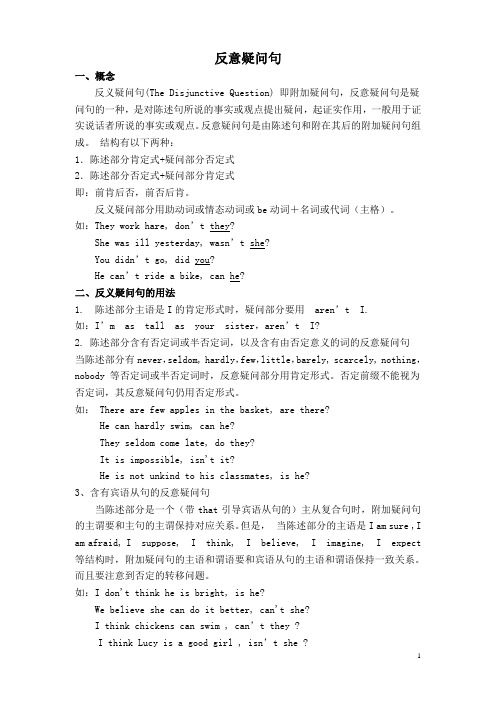
反意疑问句一、概念反义疑问句(The Disjunctive Question) 即附加疑问句,反意疑问句是疑问句的一种,是对陈述句所说的事实或观点提出疑问,起证实作用,一般用于证实说话者所说的事实或观点。
反意疑问句是由陈述句和附在其后的附加疑问句组成。
结构有以下两种:1.陈述部分肯定式+疑问部分否定式2.陈述部分否定式+疑问部分肯定式即:前肯后否,前否后肯。
反义疑问部分用助动词或情态动词或be动词+名词或代词(主格)。
如:They work hare, don’t they?Sh e was ill yesterday, wasn’t she?You didn’t go, did you?He can’t ride a bike, can he?二、反义疑问句的用法1. 陈述部分主语是I的肯定形式时,疑问部分要用aren’t I.如:I’m as tall as your sister,aren’t I?2. 陈述部分含有否定词或半否定词,以及含有由否定意义的词的反意疑问句当陈述部分有never,seldom, hardly,few,little,barely, scarcely, nothing,nobody 等否定词或半否定词时,反意疑问部分用肯定形式。
否定前缀不能视为否定词,其反意疑问句仍用否定形式。
如: There are few apples in the basket, are there?He can hardly swim, can he?They seldom come late, do they?It is impossible, isn't it?He is not unkind to his classmates, is he?3、含有宾语从句的反意疑问句当陈述部分是一个(带that引导宾语从句的)主从复合句时,附加疑问句的主谓要和主句的主谓保持对应关系。
但是,当陈述部分的主语是I am sure ,I am afraid, I suppose, I think, I believe, I imagine, I expect 等结构时,附加疑问句的主语和谓语要和宾语从句的主语和谓语保持一致关系。
高考英语总复习 反意疑问句用法

反意疑问句用法总复习反意疑问句是中学英语教学的重点难点之一,也是高考热点之一。
为此,我整理31条今天在这里整理归纳做出以下讲解。
第一部分误正辨析1、请让我们回家吧,好吗?误:Let us go home,shall we?正:Let us go home,will you?正:Let us go home,won't you?【简析】let us(不缩写)的us不包括对方在内,表示“请求”时,附加疑问句应用will you,有时也可以用won't you。
2、咱们现在回家吧?误:Let's go home now,will you?正:Let's go home now,shall we?【简析】let's包括对方,即“咱们”,表示“建议”时,附加疑问句应用shall we。
3、他上午很少回家,是不是?误:He seldom goes home in the morning,doesn't he?正:He seldom goes home in the morning,does he?【简析】在陈述部分中有never,hardly,few,little,scarcely,seldom等在句中起否定作用,反意疑问句中通常要用肯定结构。
4、多么好的孩子,是吗?误:What a good boy,is he?正:What a good boy,isn't he?【简析】感叹句都是肯定的,其反意问句要用否定式。
5、请回到你的座位上去,好吗?误:Go back to your seat,don't you?正:Go back to your seat,will you?正:Go back to your seat,won't you?【简析】陈述部分为第二人称祈使句,其后的反意疑问句用will you或won't you。
前者比后者更普通。
高中英语反义疑问句的讲解介绍
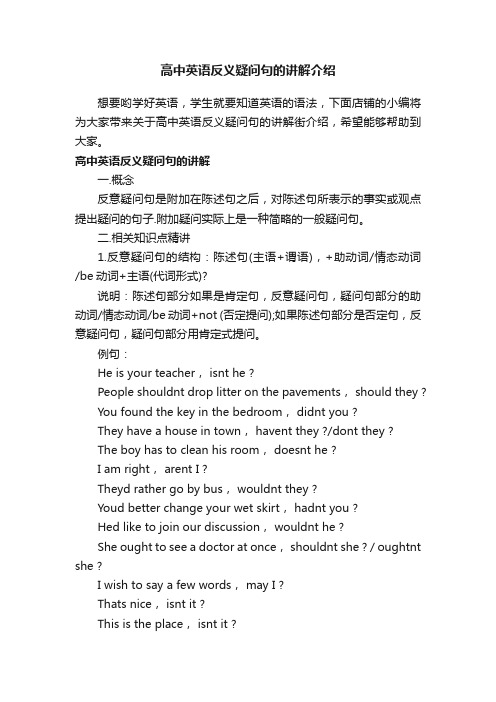
高中英语反义疑问句的讲解介绍想要哟学好英语,学生就要知道英语的语法,下面店铺的小编将为大家带来关于高中英语反义疑问句的讲解街介绍,希望能够帮助到大家。
高中英语反义疑问句的讲解一.概念反意疑问句是附加在陈述句之后,对陈述句所表示的事实或观点提出疑问的句子.附加疑问实际上是一种简略的一般疑问句。
二.相关知识点精讲1.反意疑问句的结构:陈述句(主语+谓语),+助动词/情态动词/be动词+主语(代词形式)?说明:陈述句部分如果是肯定句,反意疑问句,疑问句部分的助动词/情态动词/be动词+not (否定提问);如果陈述句部分是否定句,反意疑问句,疑问句部分用肯定式提问。
例句:He is your teacher, isnt he ?People shouldnt drop litter on the pavements, should they ?You found the key in the bedroom, didnt you ?They have a house in town, havent they ?/dont they ?The boy has to clean his room, doesnt he ?I am right, arent I ?Theyd rather go by bus, wouldnt they ?Youd better change your wet skirt, hadnt you ?Hed like to join our discussion, wouldnt he ?She ought to see a doctor at once, shouldnt she ? / oughtnt she ?I wish to say a few words, may I ?Thats nice, isnt it ?This is the place, isnt it ?Everybody knows the answer, dont they ?Nothing is serious, isnt it?There wasnt enough time at that moment, was there ?There used to a tower here, usednt there? / didnt there ?What you need is more practice, isnt it ?2.某些特殊句型的反意疑问句:1)祈使句的反意疑问句:表示肯定意义的祈使句,即表示请求,提示它的反意疑问句用will you 表达:有时也可以用wont you 表示。
高中英语反义疑问句(详细)

反义疑问句反义疑问句(The Disjunctive Question) 即附加疑问句。
它表示提问人的看法,没有把握,需要对方证实。
反义疑问句由两部分组成:前一部分是一个陈述句,后一部分是一个简短的疑问句,两部分的人称时态应保持一致。
主要形式:陈述部分肯定式+疑问部分否定式;陈述部分否定式+疑问部分肯定式。
1简述陈述部分和疑问部分要么前肯后否,要么前否后肯。
这类反义疑问句有时带有感情色彩,表示惊奇,愤怒,讽刺,不服气等。
例如:You call this a day's work,don't you?你说这就叫一天的活儿,不是吗?2句式句子结构1.陈述部分肯定句+疑问部分否定句(可记为前肯后否).例:They work hard, don’t they?2.陈述部分否定句+疑问部分肯定句(可记为前否后肯).例:You didn't go, did you?句子类型一种是反义的附加疑问句;一种是非反义的附加疑问句。
简单来说,就是“前肯后否”或“前否后肯”。
3读法规则反义疑问句陈述部分用降调,问句部分可升可降。
提问者对陈述部分把握较大时,问句部分用降调;反之用升调。
4速记方法前肯后否,前否后肯,前be后be,前情态后情态,前无be或情态后加助,并改为否定,时态一致。
5主语一般词语附加疑问句中主语用和主句一致的主语,用主格。
附加疑问句随从句。
不定代词当陈述部分的主语是(1)one时,后面的疑问句可用one/he.(2)no one时,后面附加疑问句中主语用they。
(3)everything,anything,nothing,something时,附加疑问句中主语用it 不用they(4)this, that,或those, these时,附加疑问句中主语用it或they.(5)everyone,everybody,someone,somebody,anyone,nobody等时,附加疑问句中主语一般用they (口头语,非正式文体)/he(正式文体)。
- 1、下载文档前请自行甄别文档内容的完整性,平台不提供额外的编辑、内容补充、找答案等附加服务。
- 2、"仅部分预览"的文档,不可在线预览部分如存在完整性等问题,可反馈申请退款(可完整预览的文档不适用该条件!)。
- 3、如文档侵犯您的权益,请联系客服反馈,我们会尽快为您处理(人工客服工作时间:9:00-18:30)。
反意疑问句一. 反意疑问句的结构形式:反意疑问句提出情况或看法,问对方同不同意,这种问句都由两部分组成,前一部分用陈述句的形式,后一部分是一个附着在前一部分上的简短问句,中间用逗号隔开,如前一部分为肯定形式,后一部分通常用否定形式,前一部分为否定形式,后一部分就用肯定形式,两部分的时态要一致。
如:①You are to go home via Hongkong, aren’t you?(肯定的陈述句+否定的反意疑问句)②They didn’t raise many questions at the press conference, did they?他们在记者招待会上没提出很多问题,是吧?(否定的陈述句+肯定的反意疑问句)二. 反意疑问句的答语在回答反意疑问句时,应根据事实来回答,如果事实是肯定的,前面要用yes,否则用no, 在第一部分为否定句时要特别注意,这时英语回答和汉语回答是不一致的。
如:①----You are not going out today, are you? 你今天不出去,是吗?----No, I am not. 是的,我今天不出去。
(“不出去”属于否定的事实,所以在英语中应用“no”来表示此义,不要用“yes”来回答。
)②---You are not going out today, are you? 你今天不出去,是吗?----Yes, I am. 不,我出去(“出去”属于肯定的事实,所以在英语中应用“yes”来表示此义,不要用“no”来回答。
)三. 构成反意疑问句时应注意的问题:⒈当陈述部分的主语是everybody, everyone, someone, no one, nobody, somebody等不定代词时,反意疑问句部分中的主语常用they (有时也可用he.)如:①Nobody phoned while I was out, did they? 我出去的时候没人打电话,是吧?②No one was hurt, was he? 没人受伤,是吧?⒉当陈述部分的主语是everything, anything, nothing, something等表物的不定代词时,反意疑问部分的主语常用it.如:① Everyt hing has been done on how to prevent the pollution, hasn’t it?关于如何预防污染已采取了一切措施,是吗?⒊当陈述部分的主语是one时,反意疑问部分的主语常用one或you。
如:①One can’t be too careful, can one/ you?一个人越认真越好,是吧?⒋当陈述部分的主语是man(人类)时,反意疑问部分的主语常用he。
如:Man is the master of his own fate, isn’t he?人类是自己命运的主宰,是吗?⒌当陈述部分是there be结构时,反意疑问部分用there,省略主语代词。
如:①There is something wrong with the machine, is there? 机器出了毛病了,是吗?②There won’t be any trouble, will there?不会有任何麻烦,是吗?③There u sed to be a shop, didn’t there?⒍当陈述部分是I’m …结构时,反意疑问部分常用aren’t I如:①I am late, aren’t I?我迟到了,是吗?⒎当陈述部分中含有im, in, dis, un等否定前缀或less等否定后缀时,应把陈述部分看成是肯定的,反意疑问部分要用否定式。
如:①He was unsuccessful, wasn’t he? 他没成功,是吗?②This meeting is unimportant, isn’t it? 这次会议不重要,是吗?③Your mother dislikes seeing you with me, doesn’t she? 你母亲不喜欢看到你和我在一起,是吗?④He is unfamiliar with this type of computer, isn’t he? 他不熟悉这种类型的计算机,是吗?⒏当陈述部分含有seldom, hardly, never, rarely, few, little, nowhere, nothing等否定词或半否定词时,反意疑问部分的动词应用肯定形式。
如:①She seldom goes to the cinema, does she?她很少去看电影,是吗?②Few people know him, do they? 没几个人认识他,是吗?③Bob rarely got drunk, did he? 鲍勃很少喝醉,是吗?④He has never been to London, has he? 他从没去过伦敦,是吗?⑤They can hardly understand it, can they? 他们几乎不能理解,是吗?⑥You have nothing else to say, have you? 你没有什么可说的了,是吧?⒐当陈述部分是主从复合句时,反意疑问部分中的动词和主语代词通常应和主句中的动词和主语保持一致。
如:①She says that I did it, doesn’t she? 她说是我做的,是吗?②When he goes there, he will go to see her, won’t he? 当他去那里时,他要去看她,是吗?③If you don’t sta rt early, you will be late, won’t you? 如果你不早点出发就会迟到,是吗?⒑当陈述部分的主句是I suppose, I think, I believe, I imagine等结构时,反意疑问部分往往与从句保持一致,而且要注意否定转移。
如:①I suppose that she is careful, isn’t she?我认为她认真,是吗?②I don’t believe she has gone ho me, has she? 我认为她没有回家,是吗?③I don’t believe y ou can finish the job, can you? 我觉得你完不成这项工作,是吗?⒒当陈述部分含有have,而且have作“有”解时,反意疑问部分用have/has或借助助动词do, does, did等来完成;如果陈述部分中的have是实义动词,则反意疑问部分应需借助助动词do, does, did 等来完成。
如:①He hasn’t a lot of time to spare, has he? 他没有许多可以抽出的时间,是吗?②He doesn’t have an English dictionary, does he? 他没有英语词典,是吗?⒓当陈述部分的谓语动词包括have to, had to时,反意疑问部分通常用do的适当形式。
如:①You had to take the early bus, didn’t you?你不得不乘坐早班车,是吗?②We have to do it, don’t we?我们不得不做这件事,是吗?⒔当陈述部分含有情态动词used to时,反意疑问部分可用used to形式或did形式。
如:①He used to smoke three cigarettes a day, didn’t/ usedn’t he?他过去一天常吸三根香烟,是吗?⒕◆当陈述部分是否定祈使句时,反意疑问部分常用will you.当陈述部分是肯定祈使句时,反意疑问部分常用will you/won’t you.如:①Help me to do it, will you/won’t you?帮我做这件事,好吗?②Don’t go there, will you?别去那里,好吗?◆ Let’s 和Let us都表示“让我们”,但用法上不同。
前者包括听话人,后者不包括听话人。
正因如此,它们的反意疑问句的形式常常不同:以Let’s 开头的祈使句,反意疑问部分常用shall we.以Let us开头的祈使句,反意疑问部分常用will you.如:①Let’s go skating, shall we?我们去滑冰,好吗?(说话人、听话人均去滑冰)②Let us have a look at your book, will you?让我们看看你的书,好吗?(说话人要看书,听话人不看书)⒖当陈述句部分含had better/best, would like to, would rather等约定俗成特殊短语时,反意疑问部分应保留第一个词。
如:①He had better do more speaking, hadn’t he? 他最好多说,是吗?②You would like to do it, would n’t you? 你愿意做这件事,是吗?⒗当陈述句部分是强调句或类似强调句的结构时,反意疑问部分常和句首的It is/was保持一致。
如:①It was in a pa rk that you met him, wasn’t it?你是在公园里遇见了他,是吗?②It is the first time th at he has gone there, isn’t it?这是他第一次去那里,是吗?⒘当陈述句部分为感叹句时,反意疑问句部分常用否定形式,且问句部分的动词常用be.如:①What a handsome man he is, isn’t he?他是一个多么英俊的人,是吗?②What a cold day, isn’t it?多么冷的一天,是吗?⒙当陈述部分含有情态动词must, may, can’t, 且表示推测时,反意疑问部分不能用must, may, can’t自身,应和后面的实义动词保持一致;◆ must/ may/ can’t + do 表示对现在情况的推测,反意疑问部分用一般现在时。
如:①He mu st be Mr. Chen, isn’t he?(相当于:I think he is Mr. Chen.) 他一定是陈先生,是吗?②He can’t be Mr. Chen, is he?(相当于I don’t think he is Mr. Chen.)他不可能是陈先生,是吗?◆ must/ may/ can’t + have done +过去时间状语,表示对过去情况的推测,反意疑问部分常用一般过去时。
